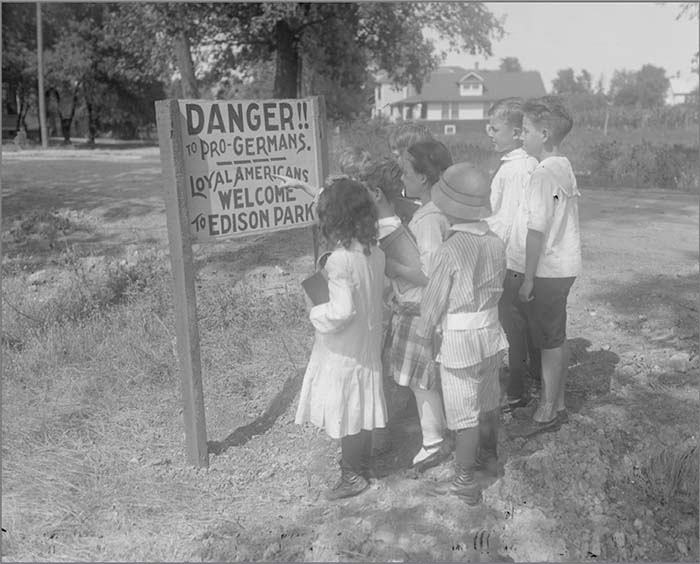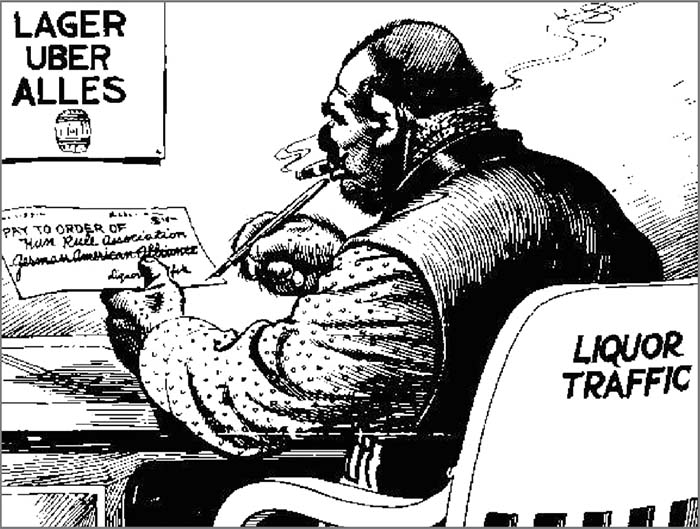America’s History: Printed Page 692
THINKING LIKE A HISTORIAN |  |
German Americans in World War I
Before 1917, Americans expressed diverse opinions about the war in Europe. After the United States joined the Allies, however, German Americans’ loyalty became suspect. German immigrant men who were not U.S. citizens were required to register as “alien enemies,” and government propaganda fueled fear of alleged German spies. In April 1918 in Collinsville, Illinois, a German-born socialist named Robert Prager — who had sought U.S. citizenship and tried to enlist in the navy — was lynched by drunken miners. The documents below shed light on German Americans’ wartime experiences.
Advertisement, Fatherland, 1915. This ad appeared in a political journal for German Americans. The translation of the songs offered on this recording are “Germany, Germany Above All” and “Precious Homeland.”
Patriotic German Music on Columbia Double-Disc Records
E2039 Deutschland, Deutschland über alles. …
10 in. — 75¢ Teure Heimat. …
COLUMBIA GRAMOPHONE COMPANY … DEALERS EVERYWHERE.
C. J. Hexamer, speech, Milwaukee, 1915. This address by a German American community leader was widely cited during a 1918 investigation by the Senate Judiciary Committee.
Whoever casts his Germanism from him like an old glove, is not worthy to be spit upon. …We have long suffered the preachment that “you Germans must allow yourselves to be assimilated, you must merge more in the American people;” but no one will ever find us prepared to step down to a lesser culture. No, we have made it our aim to elevate the others to us. …Be strong, and German. Remember, you German pioneers, that we are giving to this people the best the earth affords, the benefits of Germanic kultur.
Sign in a Chicago park, 1917.
 Chicago History Museum.
Chicago History Museum.“Lager Uber Alles” cartoon, 1918. This cartoon was part of an Ohio Anti-Saloon League referendum campaign to prohibit liquor sales. Ohio voters had rejected such a measure in 1915 and 1917, but in 1918 a majority voted for prohibition. Many U.S. breweries, such as Anheuser-Busch and Pabst, were owned by German Americans. “Hun” was an epithet for Germans; “Lager (Beer) Uber Alles” refers to the German national anthem cited in source 1.
 Courtesy of The Ohio State University Department of History.
Courtesy of The Ohio State University Department of History.James W. Gerard, radio address, 1917. Gerard was U.S. ambassador to Great Britain.
The great majority of American citizens of German descent have, in this great crisis in our history, shown themselves splendidly loyal to our flag. Everyone has a right to sympathize with any warring nation. But now that we are in the war there are only two sides, and the time has come when every citizen must declare himself American — or traitor!
… The Foreign Minister of Germany once said to me “… we have in your country 500,000 German reservists who will rise in arms against your government if you dare to make a move against Germany.” Well, I told him that that might be so, but that we had 500,001 lampposts in this country, and that that was where the reservists would be hanging the day after they tried to rise. And if there are any German-Americans here who are so ungrateful for all the benefits they have received that they are still for the Kaiser, there is only one thing to do with them. And that is to hog-tie them, give them back the wooden shoes and the rags they landed in, and ship them back. …There is no animal that bites and kicks and squeals … equal to a fat German-American, if you commenced to tie him up and told him that he was on his way back to the Kaiser.
Actions by New York liederkranz reported in New Orleans Times-Picayune, May 16, 1918. Liederkranz, or singing societies, played a vital role in German immigrant communities. Before World War I the city of Wheeling, West Virginia, counted eleven such societies, with names like Harmonie, Germania, and Mozart. By 1918 most liederkranz had vanished. New York City’s was one of the few that did not.
Members of the [New York] Liederkranz, an organization founded seventy-one years ago by Germans … met tonight and placed on record their unqualified Americanism.
… They declared English the official language of the organization, and for the first time in years the sound of an enemy tongue will not be heard in the club’s halls. Likewise they reiterated their offer to turn the buildings over to the government as a hospital if it were necessary.
Lola Gamble Clyde, 1976 interview on life in Idaho during World War I. In the 1970s, historians interviewed residents of rural Latah County, Idaho, about their experiences in World War I. Frank Brocke, a farmer, recalled that neighbors on their joint telephone line would slam down the phone when his mother or sister spoke German. “We had to be so careful,” he said.
I remember when they smashed out store windows at Uniontown that said [sauer]kraut. …Nobody would eat kraut. Throw the Kraut out, they were Germans. …Even the great Williamson store, he went in and gathered up everything that was made in Germany, and had a big bonfire out in the middle of the street, you know. Although he had many good German friends all over the county that had helped make him rich. …And if it was a German name — we’ll just change our name. …There were some [German American] boys that got draft deferments. …Some of them said that their fathers were sick and dying, and their father had so much land they had to stay home and farm it for them. …[Local men] tarred and feathered some of them. Some of them as old men dying still resented and remembered.
Sources: (1) Frederick C. Luebke, Bonds of Loyalty: German Americans and World War I (Dekalb: Northern Illinois University Press, 1974), 109; (2) Hearings Before the Subcommittee on the Judiciary, United States Senate, 65th Congress, Second Session (Washington, DC: Government Printing Office, 1918), 300; (5) Gerard speech, transcript and recording, at Library of Congress American Memory: memory.loc.gov/ammem/nfhtml/nforSpeakers01.html; (6) New Orleans Times-Picayune, May 16, 1918; (7) Oral histories of Idaho residents at GMU History Matters, historymatters.gmu.edu/d/2/. Excerpt courtesy of Latah County Historical Society.
ANALYZING THE EVIDENCE
Question
How did conditions change for German Americans between 1915 and 1918?
Question
According to these sources, what aspects of German American culture did other Americans find threatening? What forms did anti-German hostility take?
Question
Compare the sources that offer a German American perspective (sources 1, 2, 6, and 7) to those that represent a threat to German Americans’ way of life (3, 4, 5). How did German Americans respond to growing anti-German sentiment in this period?
PUTTING IT ALL TOGETHER
Question
World War I heightened anxieties about who was a “true” American. What groups were singled out in particular and why? What continuities do you see between these fears over “hyphenated” identities and controversies in earlier eras of U.S. history? Today?